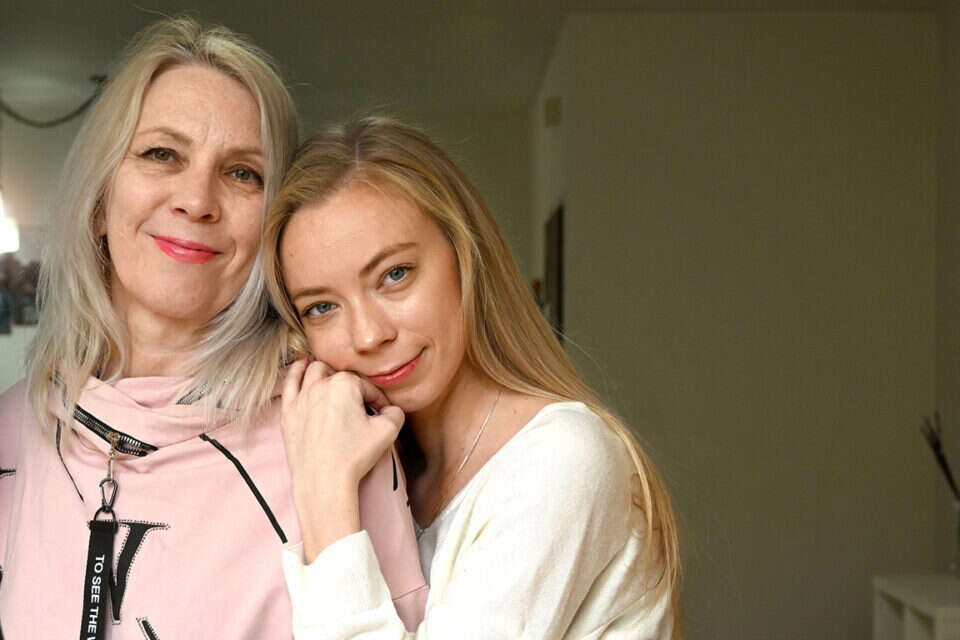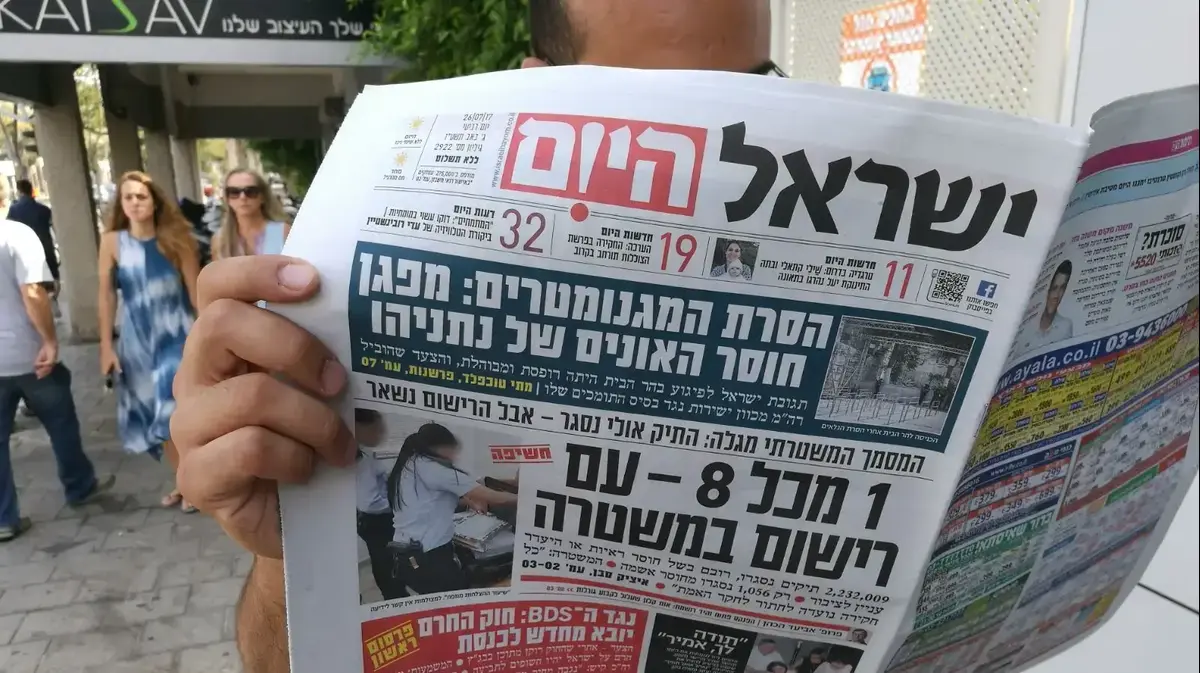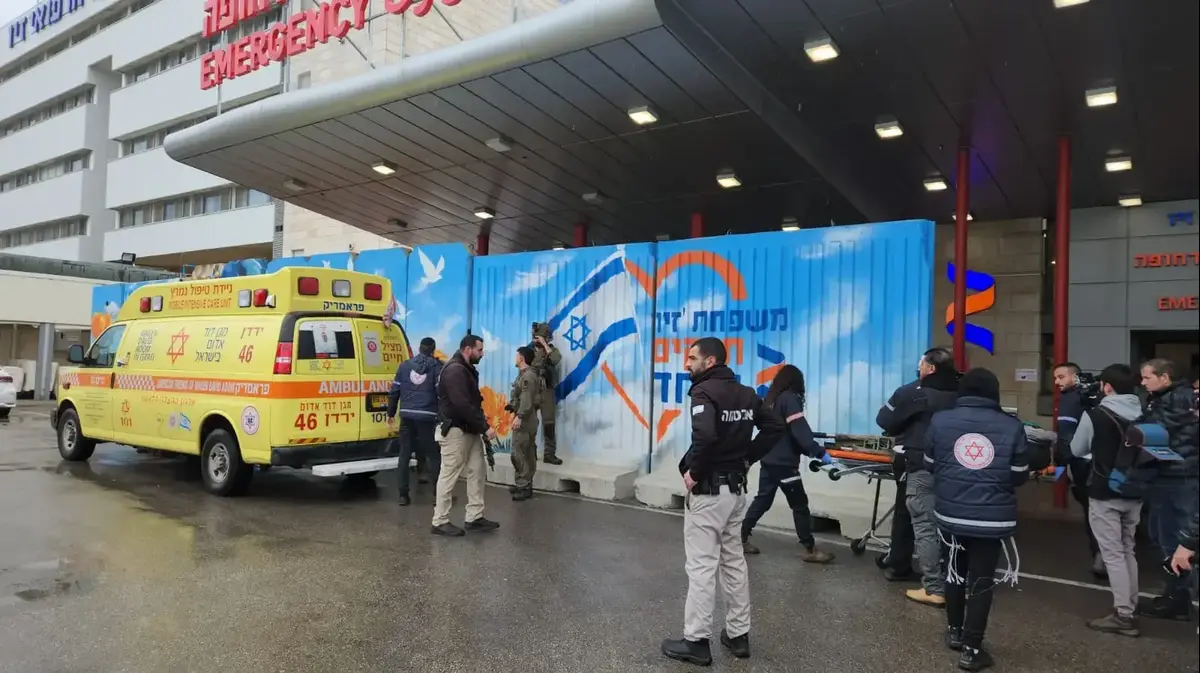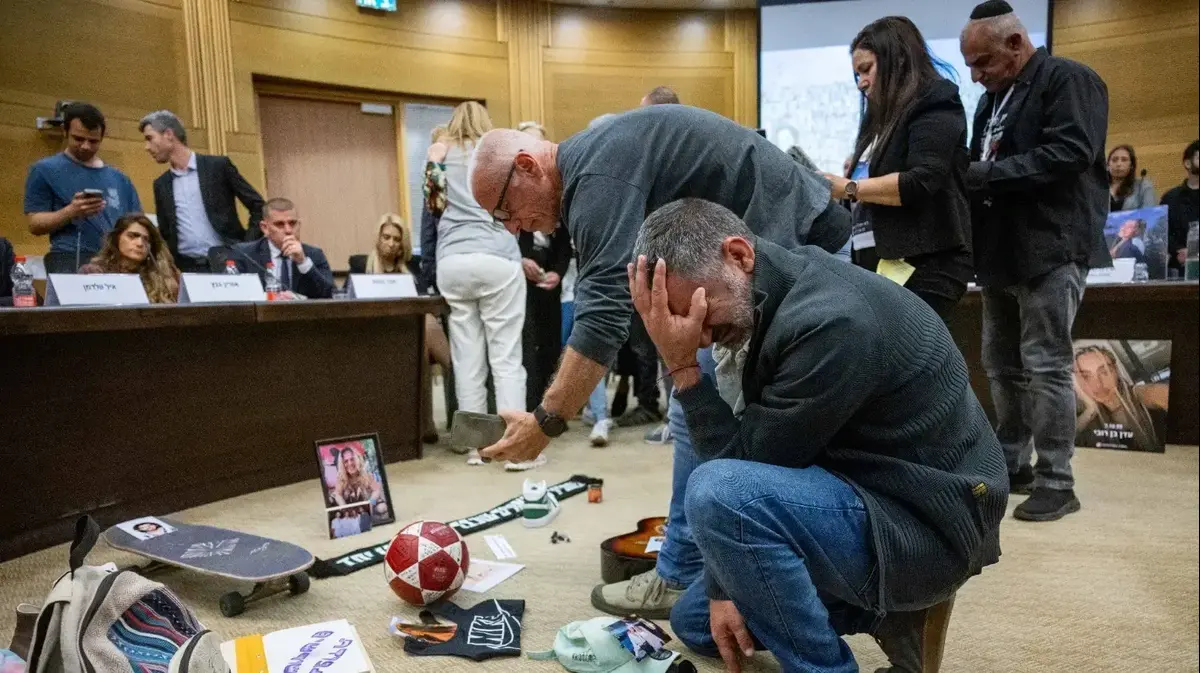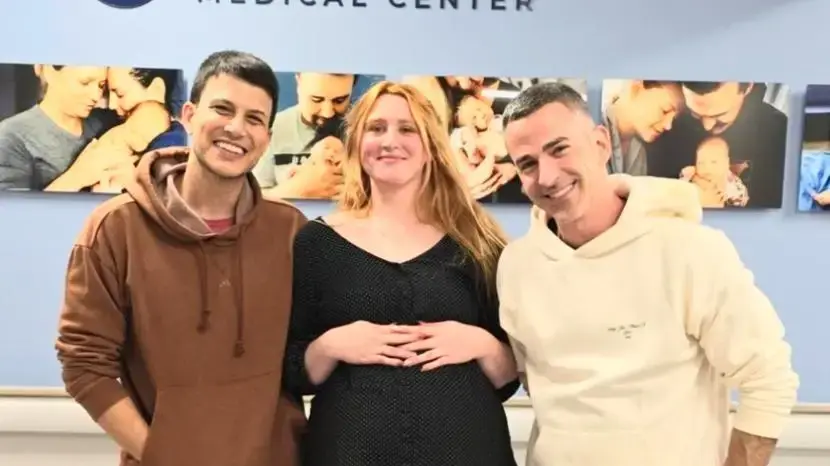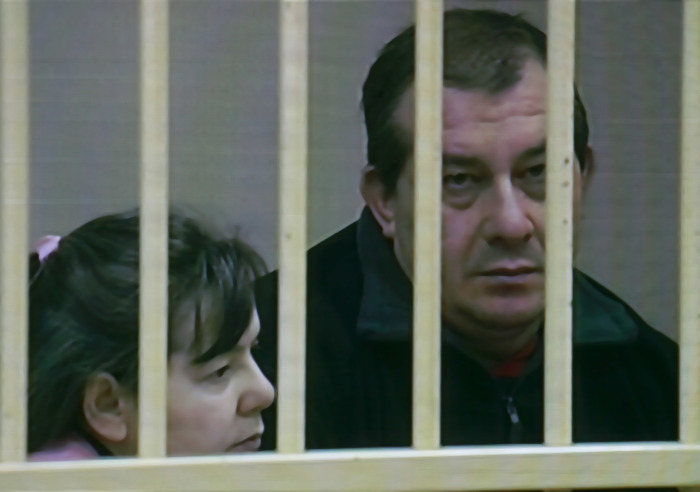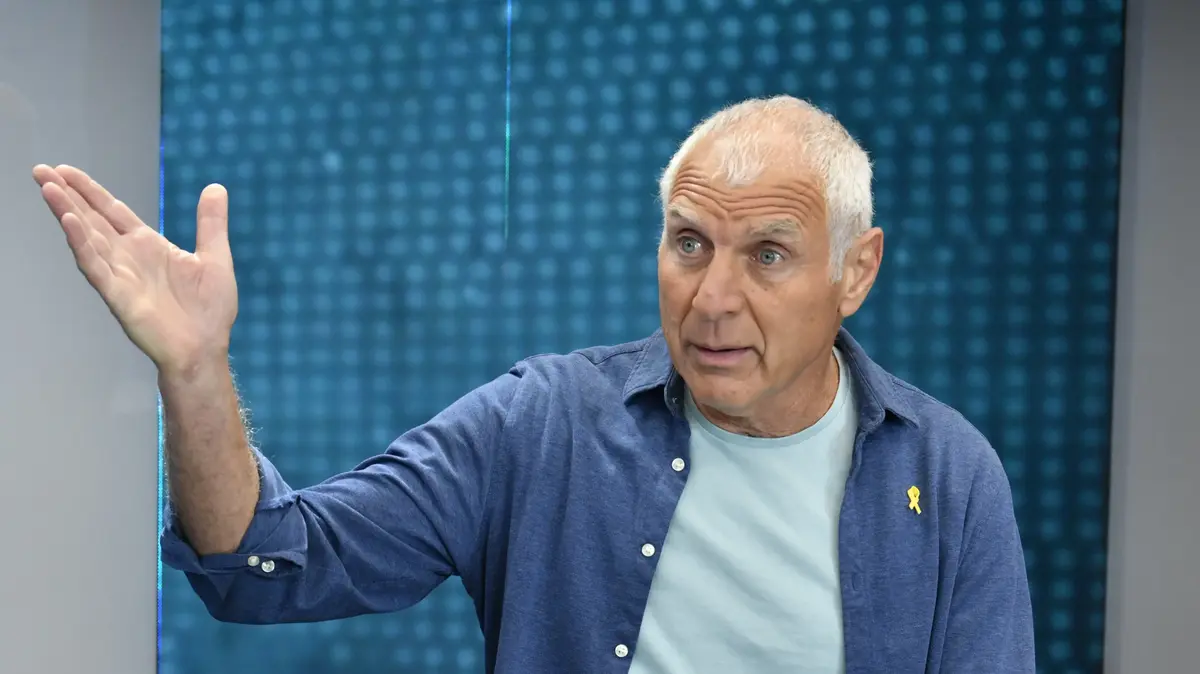In a wheelchair, still in pain from the surgery she underwent to remove a liver lobe from her body, Lyudmila Tyurina arrived at the room where her daughter, Maria, was hospitalized in the intensive care unit at Beilinson Hospital.
"My Maria, Mishinka, do you recognize me?" the mother murmured with moist eyes. "Yes, Mom, I recognize you," the excited daughter replied.
At the time, Maria did not yet know what her mother and the entire medical staff of the hospital knew: the liver lobe taken from the mother was transplanted as a donation in her body - effectively saving her life.
Maria was in mortal danger after her liver suddenly collapsed and stopped functioning. The double operation – one to remove the lobe from the mother's body, and the other to transplant the lobe within a short time in Maria's body – put the hospital's best staff and minds, including senior management, in an emergency situation.
The entire medical drama was the culmination of the harrowing journey of survival that mother and daughter have undergone over the past year, after fleeing the terror of Russian forces who occupied the city where they lived in Ukraine. A nightmarish year during which the Russians brutally bombed their neighborhood, set up a tank in their yard, and threw them into a forced course of escape, penniless, until they finally found refuge and rest in Israel.
"Only now, after such a difficult, dangerous and painful year, can we breathe a little," Maria sighs. "But we're still very worried about what's happening in Ukraine, it doesn't give us any rest."
Lyudmila looks lovingly at her daughter. "The main thing is that we are alive and that my Maria is alive. We've been through so much together. I just wanted her to live, and to continue to be with me."
"A house exploded opposite"
Until the Russian invasion of Ukraine, at the end of February 2022, Lyudmila (56) and Maria (33) lived in a handsome private house in the city of Robozhnoye, in the Luhansk region of eastern Ukraine. Lyudmila is a medical nurse by profession, and Maria taught choreography and yoga at a local university.
The father of the family, Andriy, 58, has lived in Israel for seven years and makes a living installing windows and blinds, while the mother and only daughter are left to live in Ukraine alone. When they recall the Russian bombings and inferno they endured during the war, their whole bodies tremble.
"It was horrible, you can't describe how hard it was," Maria explains. "The Russians bombed the whole neighborhood, all the houses. Right in front of us, a house exploded. Since we lived in a private house, the Russians came and wanted to bring a tank into our garden and hide it.
"There were piles of wood there to heat the house, and because the Russians didn't have the strength to evacuate them, they finally placed the tank right next to our yard. That's how we lived, in horror. The Russian soldiers would just come into our house, take food, drink water, do whatever they want with us."
Maria and Lyudmila. "After all the tragedy we went through, we preferred a place where we had a warm family", Photo: Efrat Eshel
Lyudmila: "Unfortunately, people who lived near us were killed in the bombings. I'm a nurse by training, so there were times when I was called out and treated the wounded, bandaged them myself. It was very difficult. We kept thinking about how to get out of there, but it was impossible at first."
A few weeks after the war began, the city no longer had running water or electricity. "At night we didn't sleep at all. It was a big nightmare. Real fear of death. Living conditions became unbearable, sights on the streets were impossible. Bodies in the streets, wounded people groaning in pain. Just terrible."
Maria: "The mother of a good friend of mine was killed in Russian bombings."
At first, they still managed to keep in touch with their relatives. Andrei's mother, Valentina, 76, lives two blocks away and has occasionally been contacted. The same applies to relatives living in Israel.
"From time to time we heard something from them, in messages or conversations, but that also faded," says Natalia Murashov, Andrei's sister, who has lived in Israel for 21 years. "At some point, my mother managed to escape to Poland, and from there she came to Israel. Lyudmila and Maria remained stranded in the bombed-out city."
Natalia translates the interview for us, which takes place at her home in Petah Tikva. Lyudmila and Maria speak Ukrainian, but they say they intend to start learning Hebrew now.
Meanwhile, the situation in Ruzhnoye got worse. The Russians did not stop bombing the city, including the street of Lyudmila and Maria. By a miracle, Bitan was not destroyed, unlike many other houses in the neighborhood.
"When the Russians came to our street, they had already conquered the entire city," Maria recalls. "Before the war, we didn't believe something like this could happen, but from that moment on all we wanted to do was run away."
Maria in Ukraine, before the war. "The Russians threatened to kill us too, like many others," photo from the family album
The Russians, who were interested in a quick evacuation of the city, suggested that residents leave their homes, leave everything behind and move to another city in Ukraine - Staroblsk. Lyudmila and Maria agreed and left all their equipment, and in fact a lifetime, behind them.
Lyudmila: "A month and a half after the war began, the Russians said that now they would give us a few days of quiet and that we should very much leave, because after that the explosions would continue and we would just be killed like many others in the city."
Maria: So we decided to leave everything. We went out as we were, with nothing, just my two small dogs and two small bags. Like many other residents, we were loaded into a van. The suitcases had no room, and the Russians were very angry that I brought the dogs as well. We left our entire previous lives behind and just ran away. We stood crowded, like sardines, in the Russian van and drove to a whole new life, not knowing what would happen, how we would manage, how we would live at all. Absolutely crazy situation."
Lyudmila: "Neighbors next to us were killed by the bombings. I am a nurse by training, and sometimes I bandaged wounded people myself. At nights we didn't sleep at all. It was a big nightmare. Real fear of death. Living conditions have become unbearable, impossible images of bodies in the streets."
They disembarked in the new city penniless ("They just threw us there and told us, 'That's it, you'll manage'"), and two days later managed to cross the border into the Russian city of Krasnodar. There they rented a temporary apartment and began planning the next steps in their forced journey – a mother, daughter and two dogs, with almost no change of clothes and no basic equipment.
Maria: "With all the chaos we went through, we felt that we wanted to survive, to live. We managed to cross the border again from Russia to Georgia, which was then accepting Ukrainian refugees like us, and there we returned to breathing a little. We contacted our relatives in Israel again and started organizing.
"Georgia helped us a lot. We were there for 2 weeks. Good people gave us clothes and food, everything we needed. It really warmed our hearts. At the same time, we had to make a decision: what next? Where are we going to live? And actually, how do we continue our lives from here."
Eventually, they decided to come to Israel. "We wanted to reunite with my father and the rest of our relatives here. With all the tragedy we went through, we preferred to go to a place where we have a warm family," explains Maria. They landed here at the end of April 2022.
Lyudmila: "We arrived in Israel, and immediately felt one main thing: security. Finally, after everything we've been through."
Maria shines: "First of all I got my dogs back, after they anesthetized them and transported them in special cages on the flight to Israel. Here I saw my father again, after six years of separation, and my relatives. It was very exciting."
In Petah Tikva they live with Andrei, and in the meantime have found work cleaning offices in Ramat Hachayal in Tel Aviv.
"We were very sad at first," Maria recalls. "In fact, our previous lives were broken. We left our city, our friends. We left behind us a country that is in a difficult war, with dead and great destruction. My mom and I had to start all over again. We actually managed with the cleaning work, because we saw it as a life and a livelihood, and we knew that later on we could do other things."
Worried looks on the monitor
Ten months after they arrived in Israel, the sky fell on them again.
"At the beginning of February this year, I started feeling unwell," Maria says. "Until then, everything had been fine with me, but suddenly I started vomiting and feeling really bad."
After another day of bad physical sensation, she and her family realized that something deep was wrong. She arrived at Beilinson Hospital, where the doctors identified that it was a liver problem, and gave her dialysis treatments and close accompaniment.
But from then on, a medical drama developed that no one expected: Maria's condition deteriorated rapidly, and the hospital staff realized that it was necessary to urgently remove the liver from her body and transplant a liver lobe from a living donor in its place.
Dr. Eviatar Nesher, head of Beilinson's transplant department, managed Maria's treatment. "She came to us, and her deterioration was very extreme. Rare. We found ourselves in a race against time.
"Maria came to us on Thursday, and the very next day she was anesthetized and on a ventilator. Every Beilinson stood up - from the hospital director down, lots of medical teams. She was in real danger, and we knew she had to get a liver donation."
Lyudmila and Maria in the hospital, after the transplant, photo: Beilinson Spokesperson
Dr. Marius Braun, director of the Beilinson Institute of Liver Diseases, also entered the picture. Dr. Nesher: "We did blood tests on Maria's mother, and we saw that her blood type matched that of her daughter. Then we performed very urgent tests on the mother, which included MRI, CT, liver function, and more. We came to the conclusion that Lyudmila could donate the liver lobe to her daughter.
"Throughout that weekend, dozens of hospital staff members left everything and were engaged in one thing only – saving Maria. The transplant coordinators, department heads, surgeons, anesthesiologists, nurses, and of course the hospital management all worked for this purpose."
Maria: "I was shocked when they told me what I went through. I didn't even know I was going for a transplant. I feel like I've been in a horror movie all this year, and now I'm coming out of the movie theater. I have a lot of longing for the normal life that my mother and I had before everything."
On Saturday afternoon, the medical committee of the National Transplant Center received permission to perform the transplant. Dr. Nesher: "As soon as we got the green light, we stormed the matter. We had to arrange two separate operating rooms for Maria and her mother. Many of our teams were recruited for surgery, and we worked at top speed. Dr. Vladimir Tank and Dr. Michael Gurevich operated on Lyudmila and removed the right hepatic lobe from her body. The operation took about six hours."
After Lyudmila's surgery, the medical team, headed by Dr. Nesher, conducted Maria's surgery. "Liver transplant surgery is the most complex surgery there is," says Dr. Nesher. "Even more so when you transplant only a lobe and not a whole liver. The preparation process and connections during the surgery itself are super-complex and delicate."
Maria was put into surgery, which lasted eight hours. During the process, Dr. Nesher and Dr. Vadim Zhibowski, together with their entire team, implanted the mother's liver lobe into the daughter's body.
Dr. Nesher: "It was a very big drama. Long hours in the operating room. A liver transplant is a very stressful event, especially in the very borderline state Maria was in. To relieve pressure from the operating room, I play music for the entire team, silencing it only during the critical stages of the operation. During Maria's surgery, I turned off the music after four hours, when we pumped blood into the donated liver lobe. This is a very dramatic and critical stage in surgery.
"We were very alert and attentive to the monitors. It could have reached states of resuscitation or cardiac arrhythmias. Really manic time. After we went through that, we were able to turn on the music again and continue the operation, which thankfully was very successful."
Dr. Eviatar Nesher. "Drama", photo: Shlomi Yosef
After the surgery ended, the doctors were amazed at Maria's extraordinary pace of recovery. Dr. Nesher: "You see a patient who deteriorates in a rare and extreme way, anesthetized and ventilated - and after surgery she recovers in a rare way. Within 12 hours she regained consciousness, which was very exciting for all of us."
What caused her predicament in the first place?
"She had a viral disease, and she reacted to it in a very extreme way that really threatened her life. We had to intervene at full speed, and I'm glad we were able to save her."
Dr. Eviatar Nesher, Head of Beilinson's Transplant Department: "Maria's deterioration was very extreme. Rare. We found ourselves in a race against time. We had to arrange two separate operating rooms for her and her mother. Many of our teams were recruited for surgery, and we worked at top speed."
Dr. Eran Rotman, Beilinson's director, explains that this was a very unusual event, which required his intervention and personal involvement at every stage - from the moment Maria was admitted to the hospital.
"Indeed, there was a dramatic system-wide intervention here. We immediately realized that this was a raging hepatitis, which would reach an irreversible level of liver destruction within a few days - and be life-threatening.
"We also understood that Maria had no medical insurance, and we had no doubt that we would take over the financing of all her care. Liver surgery is very expensive, and it cost us about a million shekels, but we had one thing in mind: saving Maria.
"We also understood that she would need an urgent transplant from a living donor. I head the hospital's transplant committee, and alongside me sit a social worker, a lawyer, a psychologist, a public representative and doctors. We worked all weekend and conducted extensive tests to make sure that the mother, Lyudmila, was suitable to donate a liver lobe to her daughter."
Did you meet Lyudmila before the surgery?
"Of course. We all gathered at the hospital on Saturday afternoon, which in itself is unusual and special, and after discussing the matter we approved the transplant. Beilinson fully enlisted in Maria's rescue, and I'm very proud of that."
Lyudmila reveals that she was shocked when she realized the severity of her daughter's condition, and when she heard the news from the medical staff that she could donate a liver lobe and save her life. "Maria's liver suddenly collapsed, from now to now. I became very stressed. After they explained it to me, I prayed that my liver would really fit her. After everything we went through in Ukraine, after the whole journey in which we saw death in our eyes, after we fled together, bravely - I just wanted my daughter to live.
"I didn't see any other option. I knew all the implications of the surgeries she and I would be undergoing. After all, I'm a nurse, and I understand the matter very well. They explained to me that I, too, could be hurt, God forbid, by the process. I prayed that everything would work out and pass safely."
Maria interjects: "This whole situation, which I found myself in without any warning, annoyed me a lot. So I must have just taken everything out, aggressively. Because of my condition, and because I was put to sleep, I wasn't really aware of the great drama going on around me. I no longer remember exactly what I said, who I hit and who I kissed."
Lyudmila: "I had a long operation, and then Maria had a very long operation of her own. We weren't actually together. In my recovery, I kept asking the doctors, what about her - is she waking up? Not waking up? I was very stressed."
As mentioned, Maria regained consciousness in a relatively short time. "The first sentence she said to us was: 'Where's my mother? Where are my dogs?" recalls Natalia.
Lyudmila: "When we finally met, I explained to Maria, humorously, that I had transferred my liver to her. That's how I told her what happened, because until then she didn't really understand. When she heard my explanation, she was shocked. She had trouble comprehending what had happened during the nerve-wracking hours during which she was anesthetized and on a ventilator."
Maria: I was really shocked by what I heard I went through. I didn't even know I was going for a transplant. I feel like I've been in a horror movie all this year, and now I'm coming out of the movie theater. I have a lot of longing for the normal life my mother and I had before the bloody war broke out."
Lyudmila: "I realized over the past year that all our lives are equal to zero, and that anything can actually happen. We would very much like to thank Beilinson for taking care of us, for the teams that saved my daughter. They mobilized quickly, enveloping us with warmth, concern and great professionalism. We really take our hats off to them. A great miracle happened to us - my Maria survived."
Found love in Israel
They are now trying to adjust to their new lives in Israel. The Interior Ministry issued them a permit to stay in Israel until the end of July, and they hope that the permit will be extended further until their status is settled. In the meantime, they want to learn Hebrew from apps, and are slowly starting to see some light.
Maria says she already has love here. "In one of the places where I worked as a cleaner, I met a 37-year-old man who worked there as a bartender. He's Israeli, and we've been together for six months. I realized that he was next to me in the ICU, and even slept in the hospital. It's good for us together."
Maria: "I'm recovering, and we want to live in Israel. If the liver collapse had happened to me in Ukraine, I would not be alive anymore. No one there can take care of me like they treated me here. In a state of war, there is no leisure or ability to properly handle such a complex case."
What will happen to Ukraine?
Maria is adamant: "First of all, just a victory. I donated money from here that went there, quite a portion of my salary. We pray and very much hope that our region will once again be part of Ukraine. I know that in any case, it will take a long time to rebuild the ruins from the war.
"90 percent of the houses in our city were destroyed. They just aren't. We don't know what happened to our house, because no one sent us any recent photos from there, but chances are he went too. It makes us very sad. This whole difficult event is a big hole in my heart."
Maria is still on sick leave at her father's home, but feels "much better," she says. She comes every few weeks for follow-up checkups at the hospital, and the liver her mother donated seems to be well absorbed by her body.
"If this whole liver collapse thing had happened to me, God forbid, in Ukraine, I wouldn't be alive anymore. No one could have treated me the way they treated me here in Israel. In a state of war, no one there has the leisure or ability to properly handle such a complex case."
Do you see a future for you and your mother in Israel?
"Yes. You know, throughout this nightmarish year, and even in the first stage of our arrival in Israel, I couldn't hear happy music. I could no longer teach people to dance and practice yoga, as I used to love to do. I only felt great sadness.
"Now I see a rosier life. I want to go back and teach my profession, integrate into my work in Israel, and return to joy and freedom."
erannavon9@gmail.com
Wrong? We'll fix it! If you find a mistake in the article, please share with us

